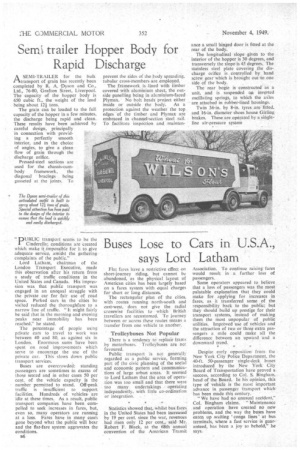Buses Lose to Cars in U.S A., says Lord Latham
Page 40

If you've noticed an error in this article please click here to report it so we can fix it.
" pUBL1C transport seems to be the Cinderella; conditions are Created which make it impossible for it to give adequate service, amidst the gathering complaints of the public." .
Lord Latham, chairman of the London Transport Executive, made this observation after his return from a study of traffic conditions in the United States and Canada. His impression was that public transport was engaged in an unequal struggle with the private car for fair use of road space. Parked cars in the cities he visited reduced the thoroughfare to a narrow line of traffic. " It might fairly be said that in the morning and evening peaks near immobility has been reached." he stated.
The percentage of people using private cars to travel to work was between 40 and 80, as against six in London. Enormous sums have been spent on. road improvements which serve to encourage the use of the private car. This slows down public transport services.
Buses are overcrowded: standing passengers are sometimes in excess of those seated and in other cases 50 per cent. of the vehicle capacity is the number permitted to stand. Off-peak traffic is insufficient to support facilities. Hundreds of vehicles are idle at these times. As a result, public transport companies have been compelled to seek increases in fares, but, even so, many operators are running at a loss. Fares have in many cases gone beyond what the public will bear and the flat-fare system aggravates the conditions.
136 Flat fares have a restrictive effect on short-journey riding, but cannot be abandoned, as the physical layout of American cities has been largely based on a fares system with equal charges for short or long distances.
The rectangular plan of the cities, with routes running north-south and east-west, does not give the radial crosswise facilities to which British travellers are accustomed. To journey between or across these routes means a transfer from one vehicle to another.
Trolleybuses Not Popular . _
There is a tendency to replace trams by motorbuses. Trolleybuses are not favoured.
Public transport is not generally regarded as a public service, forming part of the civic planning of the social and economic pattern and communications of large urban areas. It seemed to Lord Latham that the area of operation was too small and that there were too many undertakings operating independently, with little co-ordination or integration.
Statistics showed that, whilst bus fares. in the United States had been increased by 19 per cent, since the war, revenues had risen only 12 per cent., said Mr. Robert F. Black, at the 68th annual convention of the American Transit
Association. To continue raising fares would result in a further loss of passengers.
Some operators appeared to believe that a loss of passengers was the most palatable explanation that they could make for applying for increases in fares, as it transferred some of the responsibility back to the public; but they should build up prestige for their transport systems, instead of making them the most unpopular of public utilities. Impriaved use of vehicles and the attraction of two or three extra passengers a mile could make all the difference between an upward and a downward trend.
Despite early opposition from the New York City Police Department, the 40-ft. 50-passenger single-deck buses introduced by the New York City Board of Transportation have proved a. success, according to Col. S. Binghani, head of the Board. In his opinion, this type of vehicle is the most important advance in passenger transport which has been made this century.
"We have had no unusual accident," Col. Bingham claims. Maintenance and operation have created no new problems, and the way the buses have eaten up waiting conga lines' at bus terminals, where a fast service is guaranteed, has been a joy to behold," he says.




















































































